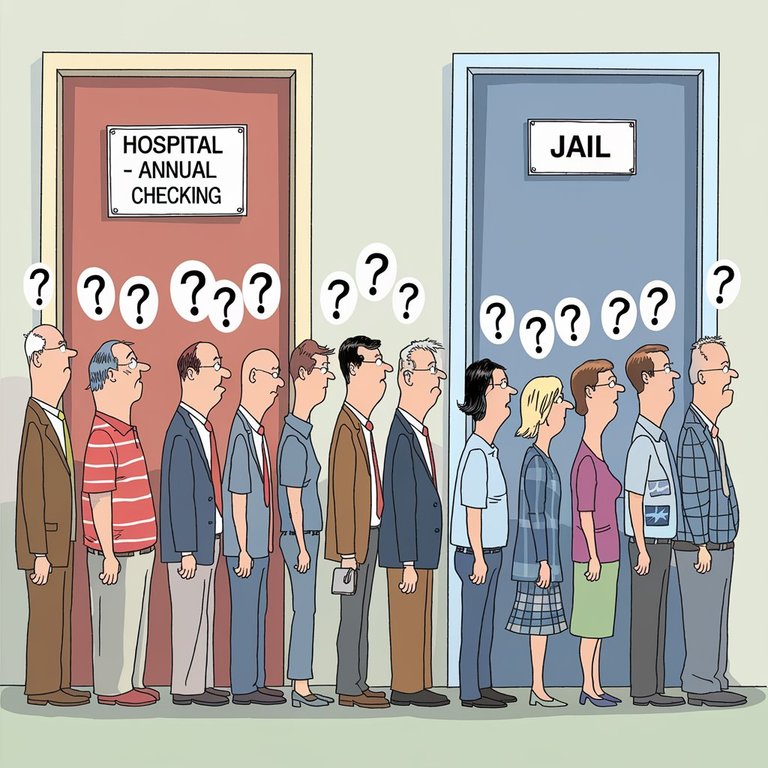As a lover of freedom, I believe that activities that do not threaten national security and society should not be penalized, in principle, but it turns out that many times individuals make decisions without thinking of other people other than themselves.
This means that many activities that might seem trivial on the surface need to be regulated by the State. For example, anyone with a bit of common sense would consider it prudent to take lessons and learn traffic rules before driving a car for the first time.
The truth is that not everyone has the level of awareness and common sense as in the previous example, and that is where intervention and regulation by the Public Administration become necessary.
In the case of public health, it is also necessary to intervene, regulate and take certain measures. I remember, for example, that when I was going to travel to Bolivia, I had to get the yellow fever vaccine, possibly because I am a citizen of a tropical climate country where mosquito-borne diseases are endemic.
And here's the interesting part, I was supposed to be the most interested in getting this vaccine, but I wouldn't have done it if it hadn't been a requirement for entry. Why? I can't explain it, so I'll attribute the reason to indolence.
And just like me, many people go through life thinking they are immune to disease and are not aware of how important it is to take preventive measures, such as getting an annual general medical checkup.
Many people joke about being in perfect health until they go to the doctor, and then the problems arise, and that's why they prefer not to go for consultations or checkups.
Whether out of fear or indolence, it seems that the average person, or a large majority, is reluctant to get medical checkups, so I think it would be a good idea to have a positive incentive for them to do so, such as a tax discount if they do.
Going to the extreme of penalizing their omission, I think, would only generate greater animosity and even suspicion on the part of the public, which would be counterproductive.
I believe the solution would rather be early awareness and education about the importance of taking care of health and conducting annual medical studies to prevent chronic diseases and act in time against serious diseases such as cancer, for example.
Of course, this entire debate would only apply to countries where the health system is universal and free, and also efficient. The reality for many people is that access to medical services is prohibitive due to their cost or because access to these services is limited due to their centralization and the need to travel long distances with the time and money costs that this entails.
But in an ideal world, it would be wonderful if most people had the opportunity and the desire to take care of their health from an early age to live a full, healthy, and long life.
Translation from Spanish using Copilot

Image Source / Fuente de la Imagen
Como amante de la libertad, considero que las actividades que no atenten contra la seguridad nacional y de la sociedad, no deberían ser penalizadas, en principio, pero resulta que muchas veces el individuo toma decisiones sin pensar en otras personas más que sí mismo.
Esto supone que muchas actividades que podrían ser triviales en apariencia deban ser reguladas por el Estado. Por ejemplo, cualquier persona con un poco de sentido común consideraría prudente el tomar lecciones y aprenderse las reglas de tránsito antes de salir a conducir un automóvil por primera vez.
Lo cierto es que no todas las personas poseen un nivel de conciencia y sentido común como en el ejemplo anterior, y es allí cuando se hace necesaria la intervención y regulación por parte de la Administración Pública.
En el caso de la salud pública, también es necesario intervenir, regular y tomar ciertas medidas. Recuerdo por ejemplo, que cuando iba a viajar a Bolivia, tuve que aplicarme la vacuna contra la fiebre amarilla, posiblemente por ser ciudadana de un país de clima tropical en el que las enfermedades transmitidas por mosquitos son endémicas.
Y aquí está lo interesante, se supone que yo debería haber sido la más interesada en aplicarme dicha vacuna, pero no lo hubiera hecho si no hubiese sido un requisito para el ingreso. Por qué? No puedo explicarlo así que adjudicaréel motivo a la indolencia.
Y así como yo, muchas personas van por la vida pensando que son inmunes a la enfermedad y no son concientes de lo importante que es tomar medidas preventivas, como sería el hacerse un chequeo médico general anual.
Muchas personas lo toman a broma diciendo que gozan de perfecta salud hasta que van al médico y allí aparecen los problemas, y que por eso prefieren no ir a consultar o a hacerse los chequeos.
Sea por miedo o indolencia, parece ser que el promedio de personas, o una gran mayoría siente rechazo a realizarse chequeos médicos , por lo que creo que sería buena idea que existiera un estímulo positivo para que lo hagan, como por ejemplo, un descuento en los impuestos si lo hacen.
Llegar al extremo de penalizar la omisión de los mismos, creo que sólo generaría mayor animadversión y hasta suspicacia por parte del público, lo que sería çcontraproducente.
Creo que la solución sería más bien una concientización y educación temprana sobre la importancia de cuidar la salud y de realizar los estudios médicos anuales para prevenir enfermedades crónicas y actuar a tiempo ante enfermedades graves como el cáncer por ejemplo.
Por supuesto, todo este debate solo sería aplicable para países en los que el sistema de salud sea universal y gratuito, y además eficiente. La realidad para muchas personas es que el acceso a los servicios médicos es prohibitivo por el costo de los mismos, o porque el acceso a éstos es limitado debido a una centralización de los mismos y a que deben desplazarse grandes distancias con el costo en tiempo y dinero que ello implica.
Pero en un mundo ideal, sería fabuloso que el común de las personas tuviera la oportunidad y el deseo de cuidar su salud desde una edad temprana para poder vivir una vida plena, saludable y longeva.



